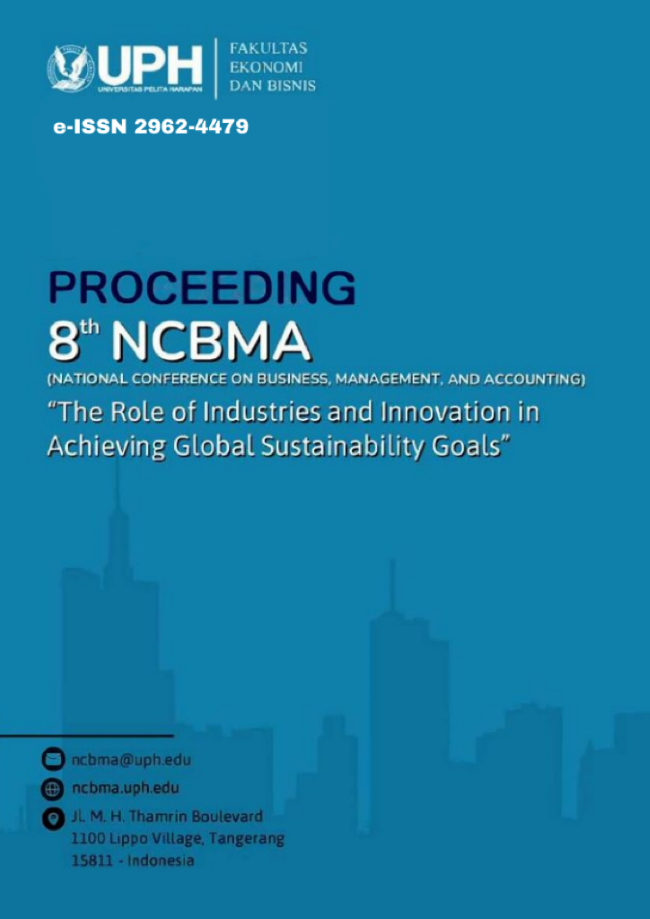THE INFLUENCE OF CEO EX-AUDITOR BACKGROUND, CEO EXPERT POWER, AND CEO OWNERSHIP POWER ON FINANCIAL STATEMENT READABILITY
Λέξεις-κλειδιά:
CEO Ex-Auditor, CEO Expert Power, CEO Ownership Power, ReadabilityΠερίληψη
This study examines the influence of three CEO characteristics—prior experience as an auditor (Ex-Auditor), expert power, and ownership power—on the readability of financial statements in the banking sector in Indonesia. The sample includes 42 banks listed on the Indonesia Stock Exchange (IDX), observed over four years from 2020 to 2023, resulting in 168 firm-year observations. Purposive sampling was used to select firms that disclosed relevant CEO information and published financial statements in English. Readability was assessed using the Gunning Fog Index, which was explicitly applied to the narrative disclosures in the notes and financial statements. Results from multiple linear regression analysis show that CEO Ex-Auditor experience and CEO Expert Power significantly and positively affect financial statement readability. In contrast, CEO Ownership Power does not exhibit a vital influence. These findings underscore the role of experience-based leadership in enhancing the clarity and transparency of corporate financial disclosures.
Αναφορές
Albrecht, W. S., Mauldin, E. G., & Newton, N. J. (2018). Do auditors recognize the potential dark side of executives’ accounting competence? The Accounting Review, 93(6), 1–25. https://doi.org/10.2308/accr-51991
Anton, C. (2010). Stewardship theory of management: A theoretical approach. Annals of the University of Oradea, Economic Science Series, 19(2), 716–721.
Bao, S. R., & Lewellyn, K. B. (2017). Ownership structure and earnings management: Theory and evidence from China. Journal of International Accounting Research, 16(2), 45–61. https://doi.org/10.2308/jiar-51730
Chen, S., & Zheng, H. (2014). CEO tenure and firm performance: Evidence from China's listed firms. Journal of Applied Business Research, 30(1), 155–167.
Finkelstein, S. (1992). Power in top management teams: Dimensions, measurement, and validation. Academy of Management Journal, 35(3), 505–538. https://doi.org/10.5465/256485
Gunning, R. (1952). The technique of clear writing. New York, NY: McGraw-Hill.
Hambrick, D. C., & Mason, P. A. (1984). Upper echelons: The organization as a reflection of its top managers. Academy of Management Review, 9(2), 193–206. https://doi.org/10.5465/amr.1984.4277628
Healy, P. M., & Palepu, K. G. (2001). Information asymmetry, corporate disclosure, and the capital markets: A review of the empirical disclosure literature. Journal of Accounting and Economics, 31(1–3), 405–440. https://doi.org/10.1016/S0165-4101(01)00018-0
Jensen, M. C., & Meckling, W. H. (1976). Theory of the firm: Managerial behavior, agency costs, and ownership structure. Journal of Financial Economics, 3(4), 305–360. https://doi.org/10.1016/0304-405X(76)90026-X
Loughran, T., & McDonald, B. (2014). Measuring readability in financial disclosures. The Journal of Finance, 69(4), 1643–1671. https://doi.org/10.1111/jofi.12162
Mustapha, U. A., Rashid, N., Abdullahi, S. R., & Obasi, R. O. (2020). The influence of CEO characteristics on financial reporting quality in Nigerian non-financial listed companies. International Journal of Financial Research, 11(2), 215–224. https://doi.org/10.5430/ijfr.v11n2p215
Rizky, M. F. (2019). Pengaruh karakteristik CEO terhadap kualitas laporan keuangan. Jurnal Akuntansi dan Keuangan Indonesia, 16(1), 1–14.
Seifzadeh, M., Salehi, M., Abedini, B., & Ranjbar, M. H. (2020). The relationship between management characteristics and financial statement readability. International Journal of Disclosure and Governance, 17, 107–121. https://doi.org/10.1057/s41310-019-00075-6
Spence, M. (1973). Job market signaling. The Quarterly Journal of Economics, 87(3), 355–374. https://doi.org/10.2307/1882010
Ting, H. I., Chueh, H., & Chang, P. R. (2017). CEO power and its effect on performance and governance: Evidence from Chinese banks. Journal of International Financial Management & Accounting, 28(2), 212–248. https://doi.org/10.1111/jifm.12058
Victor, T. (2010). Pengaruh pengalaman auditor terhadap kualitas audit. Jurnal Akuntansi dan Auditing, 7(1), 1–10.
Λήψεις
Δημοσιευμένα
Τεύχος
Ενότητα
Άδεια

Αυτή η εργασία είναι αδειοδοτημένη υπό το Creative Commons Attribution-ShareAlike 4.0 International License.

